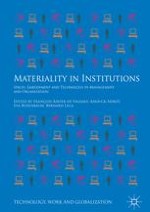2019 | OriginalPaper | Buchkapitel
8. Websites and the Discursive Legitimation of New Ventures: Embracing Conformity and Distinctiveness
verfasst von : Fernando Pinto Santos
Erschienen in: Materiality in Institutions
Verlag: Springer International Publishing
Aktivieren Sie unsere intelligente Suche, um passende Fachinhalte oder Patente zu finden.
Wählen Sie Textabschnitte aus um mit Künstlicher Intelligenz passenden Patente zu finden. powered by
Markieren Sie Textabschnitte, um KI-gestützt weitere passende Inhalte zu finden. powered by
